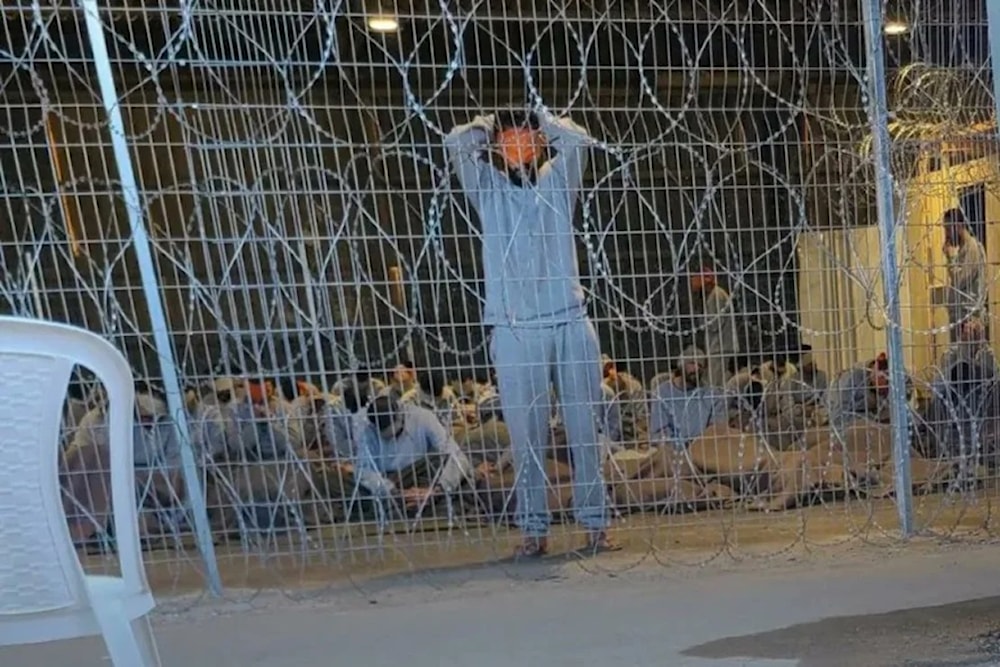UN Committee accuses Israelis of sexual abuse, dehumanizing prisoners
The Special Committee to Investigate Israeli Practices Affecting the Human Rights of the Palestinian People and Other Arabs in the Occupied Territories declared its members were "shocked" by the degree of impunity of the IOF who committed dreadful violations of Palestinian rights.
-

A leaked photograph of the detention facility shows a blindfolded Palestinian prisoner with his arms above his head (Obtained by CNN)
A UN commission examining human rights breaches in the occupied Palestinian territories accused Israeli occupation forces (IOF) Tuesday of raping, degrading, and dehumanizing Palestinian men, women, and children in their custody.
The statement explained that "Multiple stakeholders reported a stark increase in sexual harassment, sexual abuse, the threat of rape, and rape itself, including with foreign objects, against men, women, and even children, as well as intimidation through the use of dogs."
The Special Committee to Investigate Israeli Practices Affecting the Human Rights of the Palestinian People and Other Arabs in the Occupied Territories declared its members were "shocked" by the degree of impunity of the IOF who committed dreadful violations of Palestinian rights.
According to the committee, they are "publicly and shamelessly sharing photos on social media platforms that violate the privacy and intimate sphere of Palestinian women, aimed to mock, shame, and humiliate them."
Israeli soldiers posted images of themselves playing and wearing underwear belonging to killed or displaced Palestinian women during their raids on civilian homes in Gaza. pic.twitter.com/qOhCN1Xn0B
— Quds News Network (@QudsNen) June 7, 2024
On June 12, an independent global panel under UN auspices declared that Israeli authorities were accountable for several war crimes and crimes against humanity perpetrated in Gaza since October 7, 2023.
Read more: UN Special Rapporteur slams Israeli use of Palestinian as human shield
In March, an internal report by the UN Relief and Works Agency for Palestine (UNRWA) detailed the violence against Palestinian detainees in Israeli detention centers, such as beatings, dog attacks, extended use of stress positions, and sexual assault.
Based on interviews of over 1,000 Palestinian detainees released at the Karem Abu Salem crossing point since December, in the presence of UNRWA staff, the report said that there were 29 children as young as six (26 boys and three girls), 80 women, and 21 UNRWA staff, some of whom had chronic conditions, such as Alzheimer’s or cancer.
“Detainees reported being taken on trucks to large makeshift ‘military barracks’ housing 100-120 people each, where they were held, often for weeks at a time, in between periods of interrogation at a nearby location,” the UNRWA document said.
The report included allegations of widespread sexual assault, but rape was not mentioned, although it is a known fact of being a tool of torture in Israeli prisons despite a previous UN report stating otherwise. Women reported being groped while blindfolded, and many male prisoners said they were beaten in the genitals.
Released Palestinian detainees recount horrors in Israeli jails
Palestinian detainees recently released by the Israeli occupation have spoken out about their ordeals at the hands of the Israeli jailers, including inhumane treatment and abuse.
Palestinians, who were detained by "Israel" without charges since the beginning of the war on Gaza, have retold harrowing tales of systemic mistreatment by prison personnel and reported being beaten by Israeli troops.
Speaking from Kamal Adwan Hospital in Gaza, they recounted violent and degrading treatment, including blindfolding and handcuffing inmates in small cages.
"We have left but we call on you to get the rest out," implored former detainee Ataa Shbat from the Kamal Adwan Hospital in Gaza after his release.
Shbat expressed that many detainees thought they were presumed dead by their families.
"People are dying. Torture which you cannot imagine unless you taste it [experience it]. Suffering which you cannot imagine unless you experience it," he recalled.
Former detainee Aalam Hijazi stated that "prisoners were dying every day," as the lack of food and medicine was allowing diseases to "eat their bodies." He recalled wearing the same clothing since the war began, citing that even the water was not appropriate to drink.

 4 Min Read
4 Min Read










